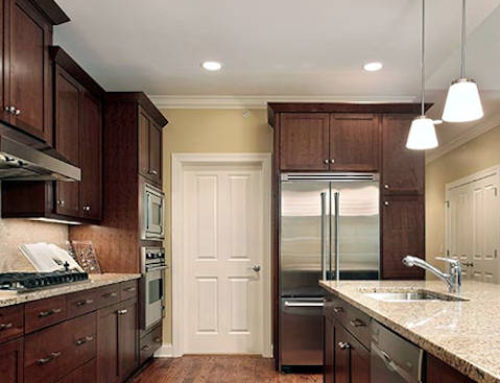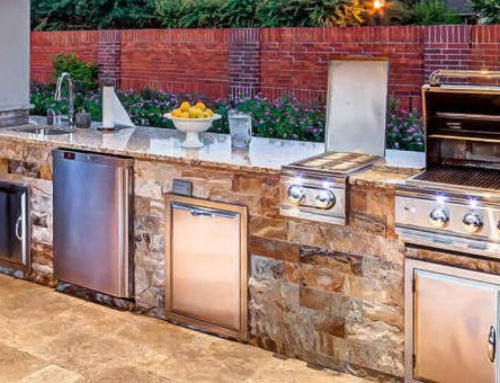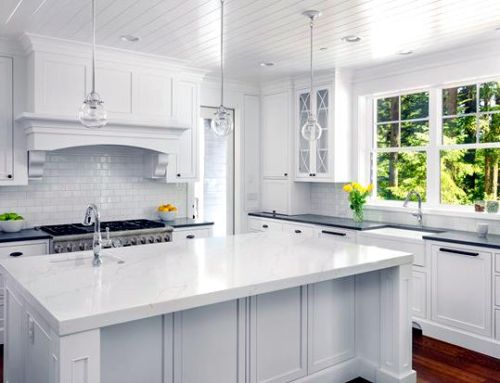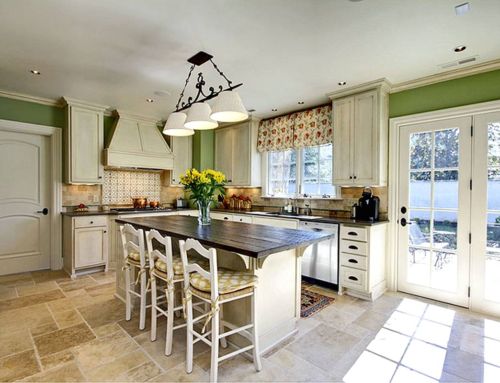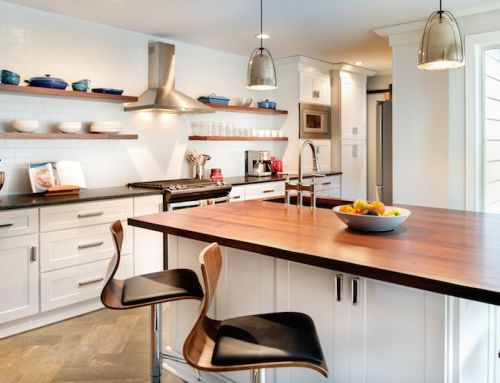
As noted in our post about kitchen remodeling trends, both granite and quartz countertops have enjoyed increased popularity over the last few years. In this article, we’ll take a close look at the differences between granite countertops and quartz countertops from various perspectives.
We hope this article helps you make a decision between the two materials for your new kitchen counters!
A few of the major differences between granite and quartz countertops
The makeup of granite vs quartz
Granite is a completely natural igneous (think volcanoes) stone created when magma undergoes a cooling process. One thing most folks don’t realize is that granite contains primarily quartz, feldspar, mica, amphiboles, and other minerals – and it is this variety that gives granite its attractive speckled pattern. Because of the variety of minerals comprising granite, granite countertops are available in a few different colors, the most common of which are white and cream. Granite slabs destined for kitchen counters can also be largely brown or black, red, or even pinkish in color.

Quartz has exploded in popularity primarily due to a high level of customization regarding its appearance. Quartz looks like 100% natural stone, even though it isn’t, and at the same time, homeowners can customize the design to fit their needs in terms of color.
Because quartz countertops are engineered, there is a much wider variety of color options for quartz.
More than 90% on the crust is composed of silicate minerals. Most abundant silicates are feldspars (plagioclase (39%) and alkali feldspar (12%)). Other common silicate minerals are quartz (12%) pyroxenes (11%), amphiboles (5%), micas (5%), and clay minerals (5%). The rest of the silicate family comprises 3% of the crust. Only 8% of the crust is composed of non-silicates — carbonates, oxides, sulfides, etc.
— Quora – Geology: What are the most abundant minerals on Earth’s crust?
Environmental impact: Granite vs quartz kitchen countertops

After quarrying and shipping are factored in, a granite countertop probably has a much greater carbon footprint since high-end granite is often shipped from places like Italy and other distant locations. Alternatively, quartz countertops are engineered – often at a closer locale than the granite might be shipped from – and thus (usually) have a significantly smaller carbon footprint.
For a smaller net carbon effect, consider using indigenous stone, granite from nearby, or quartz which has been manufactured in your region. (Broderick Builders of Nashville)
Price: Granite vs quartz
From a cost perspective, the decision between granite and quartz countertops is basically a toss-up. Both granite and quartz can range from $60-$180 per square foot installed, depending on a number of factors.
The two materials start around $10 per square foot at retailers like Lowe’s and Home Depot.
The cost to purchase granite and have it installed by home remodeling professionals can cost between $2,000 and $4,000 on average. Some DIY folks opt to save money by purchasing the granite from a wholesaler and performing some of the initial work. Due to various factors including the daunting weight of most quality granite countertops, the machining and installation of the countertops should be left to the remodeling professionals at Broderick Builders of Nashville, TN.
Call Broderick Builders today at 615.385.3210 to get your own custom estimate for your kitchen countertop installation.
The average cost for installation of quartz countertops can be between $1,500 and $5,500, depending mostly on the style of countertop edging as well as the quality of the quartz used. As with granite above, some DIYers can end up saving money by conducting a portion of the setup work themselves. But keep in mind that engineered quartz countertops weigh more than most other stone surfaces; therefore, the installation is best left to the residential renovation professionals at Broderick Builders.
Cleaning and maintenance: Granite vs quartz
In the cleaning and maintenance category, we believe quartz holds the advantage.
Due to the fact that quartz countertops are engineered, they are completely non-porous.

- Colored liquids, in particular, can result in staining of your granite (or other natural stone) countertop.
- Germs in the form of viruses and/or bacteria can soak into and thus hide within the pores and capillaries of granite and other natural stone countertops.
There’s a potential way around this for those who prefer granite: Sealants are available for granite and other natural stone. So, if properly sealed, germs can be prevented from hiding within the granite. But keep in mind that sealants break down over time, requiring reapplication of the sealant.
Note that some countertop manufacturers (e.g., HanStone, Silestone, a few others) apply a germ-fighting coating on their countertops which enhances hygiene.
Quartz countertops are often preferred in households with young children and/or the elderly, who are often more susceptible to viruses and bacteria than other folks.
Potential damage from heat, scratching, etc.
Granite is an igneous rock formed from volcanic magma by intense heat; therefore, granite is naturally able to withstand high temperatures without any damage at all. Although hot appliances won’t damage the granite itself, any sealant on the granite could be negatively impacted.
Quartz countertops are far more susceptible to heat damage and getting scratched than granite.
The resins used to give quartz countertops their shape and flexibility can be melted or warped with the application of high temperatures. Certain lower-quality brands of quartz counters are known to become discolored by hot appliances (e.g., electric skillets, crock pots, hot pots & pans, etc.).
Conclusion: Granite vs quartz

A significant majority of homeowners installing kitchen counters today end up choosing quartz – so for this reason, quartz may appeal to a larger percentage of house hunters than granite, now a distant second. In the ever-changing world of kitchen renovation trends, according to one industry survey, many people consider granite to be outdated.
Resources: Granite vs quartz countertops
- Quartz vs. Granite Better Countertop Material – Consumer Reports
- Granite vs. Quartz: Is One Better Than The Other? HGTV
- Granite vs. Quartz Countertops – CounterTop Guides
- Quartz Vs. Granite Countertops: A Geologist’s Perspective – Forbes
- Quartz vs. Granite Countertops: A Comparison – The Spruce
- Granite Versus Quartz Countertops: Pros and Cons – Countertop Investigator
- Quartz vs Granite Countertops (Pros, Cons, Differences, Costs) – HomeAdvisor
- 10 Surprising Reasons Granite Countertops Are Superior To Quartz – Architypes



